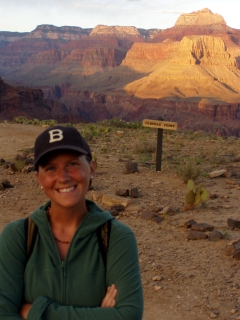
Whoa. I didn't mean to write a novella. I really didn't. But I've been sitting on this for a while. This morning, it all came out.
Let me back up and tell you what I'm talking about: this morning, I'm taking part on the AdoptLit Book Tour hosted by the
ever-lovely Lori. The selection is:
Found: A Memoir
And my bit is below.
To continue to the next leg of this book tour, please
visit the main list at The Open Adoption Examiner. I am really looking forward to hearing the varied perspectives here.
**
Time and time again as I was reading passages in Jennifer Lauck’s latest book
Found: A Memoir
, I had to put the book down, step away, breathe. At times because I felt so diametrically opposed to what the narrator was saying. Angry. Hurt. At times because the familiarity was too much to bear. On too many levels.
It is so hard to assess or critique a memoir. Harder than any piece of fiction or third party account. This is someone’s truth. How do you separate someone’s truth from the story being told and how the narration flows? How do you deduct style points from words so connected to someone’s life and essence? Can you?
In this particular instance, I can’t. So, what you’ll find here is me attempting to make sense of the myriad of emotions and reactions I felt (as a fellow adult adoptee from a closed adoption, mother of two dead children, and someone actively pursuing a family through surrogacy and donor eggs) reading and reflecting on
Found: A Memoir
.
Luckily, I have some questions to guide me. And I’ll get to those in just a bit.
The first 70 pages of Found were a struggle for me. I felt detached from the narrator, purposefully pushed away. And I was annoyed. Until I recognized the tactic.
The passive voice, the absence of emotion, speaking almost nonchalantly about life-changing events…this was my m.o. after we lost our daughters. It’s how I functioned when I was forced to function. “Life had been brutal to me and I’d go ahead and be brutal in return.” (28) It is that gray area between going for shock value and simply attempting to cope.
I found myself being pulled further into the story as Jenny reads through the non-identifying information of her birth parents for the first time (77). The dizziness, the room spinning, your reality completely altered but not really. Assurances, suspicions confirmed, new information revealed. Oh yes. I get that. In fact,
I wrote about it here.
But just as I would develop a connection with the narrator, I would be pushed away again.
As someone who does not have living children, I felt a little dissed by the author's assertions that being a mother brings clarity that is otherwise impossible to have. Did others read this the same way? Do you agree? Disagree?(I wonder if it’s cheating to answer your own question? I’m so eager to read how others respond to this.)
For me, the author’s voice shifts dramatically any time she is near her own children. And she states more than once that it wasn’t until she became a mother herself that she realized the loss of her own mother and need to reconnect. It’s true,
my own search began after the birth of our daughters. My rationale was different:
Why are you choosing to search? I know what it is like to lose a daughter and to live with that loss every day. I would like to bring some peace and some closure to my birth parents, if I am able.
In my mind, I wasn’t the one who lost out.
The author holds motherhood, specifically to one’s own genetically linked children, as sacred. I wonder for someone who has experienced so much loss and deprivation if she realizes what a place of privilege she is speaking from? At these points in the book I read the tone as condescending (if I were a mother, I’d understand…) and felt my loss and inability to be a mother acutely. It stung. And made me resentful. These were the times I had to remind myself over and over again: this is not MY story. This is not my truth. It is hers.
And this is where discussing a memoir is so damn tough. Because just as I decide, “that’s it. I’m done,” I read a passage like the one on page 105 when Jenny’s adopted friend simply can’t understand why she wouldn’t want to search for her birth mom too:
“I bet your mother is waiting for you too.”
“What if she’s not?”
Yes, what if she’s not?
If a first mother is not willing to have contact with her child or adoptive family, is it prudent to attempt to compel the first mother into an open relationship?It’s hard to read Jenny’s birth mom here – her intentions, her emotions. All we can see is what Jenny wants her to be. How the narrator perceives these things. It’s the only filter we have. Did Catherine really want a reunion or was she coerced into it? Guilted into it? Or is she far more complex than outward appearances? We can only wonder, just as the narrator does.
My truth is that my birth mother would rather not see me. She knows I’m looking. She’s spoken with the agency social worker and said, yeah, um, no thanks. Her rationale? I was told she’s a counselor and knows “reunions are never what either party wants them to be. They can never meet expectations. I would rather know she’s ok and leave it at that.” That’s what I was told.
Again, just like Jenny’s mom, who knows what else lurks beneath the surface. Shame? A desire to forget? Regret? Simply not wanting a life to be disrupted? I don’t, I can’t know.
My birth father, who was overjoyed to meet me, can’t understand why I’m not furious. I can’t explain it. I get it. In fact, I kind of like her more? Because it feels like something I would do. God, what an asshole.
In fact, the more stories I hear about her, the photos I see, the things I pick up from her once lover, my birth father, convince me that we are probably 100% alike.
And would probably annoy the shit out of each other. Because we’re like that. (I think)
Back to the question: I don’t think anyone should be compelled into a relationship they don’t want. What is the value? Beginning with a tone of obligation? Compliance? These are emotions I hate most in any family dynamic. I would never want to be the source of them. Here’s what I think is non-negotiable: non-identifying information, health records, a name – your name, the one you had when you were born.
As to reunions, man they are hard. No matter how you slice them. There is the initial honeymoon,
that moment you have been looking for your entire life , almost immediately followed by a
shitload of questions and existential angst, and then, alas, the dénouement aka,
the let down.While my birth mom said no thanks, my birth father said oh yes please and let’s be best friends and you can come over, right? It was all a little much. There was no time spent “building bridges of trust” (202) no caution taken. (did I mention the time he pointed out the park he and my BM
used to have some fun, heh heh heh? Cringe.) But we’re getting past that now.
The centerpiece of a reunion isn’t necessarily the people whose loins you’ve passed through. For me, it was getting to know my birth aunt. For Jenny, it seems as if that connection was made with her sister. There is a knowing. “This is the way my people are” (212) that just might make it worth it.
The detachment, anger and loss I read in the author's voice at times made me question my own pursuit of a child that will not be genetically linked to me. For others who have or may be pursuing parenthood through adoption or third party reproduction, did anything in the book give you pause? Make you question how your family has come together?Again, disclaimer, I’m answering my own question. For me, the answer is hell yes. I grew really tired of hearing about the Primal Loss and irreparable damage. As my non-adopted husband constantly reminds me, “we’re all damaged, babe.”
Issues around identity, origin, connectedness – I think about this shit nonstop, as I am sure many, many people who have built families through nontraditional means do. I believe there is a balance between recognizing and honoring origins and finding a space of love and acceptance in a family that is not genetically yours. These things can co-exist. I believe this. I HAVE to believe this.
A passage that gave me chills was when Jenny and Catherine are looking at one of Jenny’s baby photo – one where she’s “stiff-arming” her adopted mom. (195) Holy shit. This is something I do even now. Try to hug me when I’m not down with it, you’ll feel my entire body go rigid. My jaws clench. Uninvited physical contact = shudder. Step off homey, you don’t know me like that. But wait, are you saying this is because I’m adopted? That I’ve been trained to do this from day one? I’m a little incredulous at that assumption. I think I just don’t like other people touching on me.
But still, the stiff arm. It is a monumental fear. Hell,
I’ve even dreamt about it.
It’s the constant wonder –
what if I don’t pass the test?If there were any doubts left about how the author really feels about adoption, she lays it out in the Endnote. Is this a full on condemnation of adoption? Is there no scenario in which an adopted child grows up totally normal? Are you telling me I was screwed the moment the docs plucked me? Are my non-genetically linked future maybe children destined to the same fate?
I can’t, I won’t, believe it.
Found: A Memoir
is Jenny Lauck’s truth. I can honor her story and her expression of it. I can also share with you a little bit of mine.
Thank you, Jenny, for being open to this conversation.








